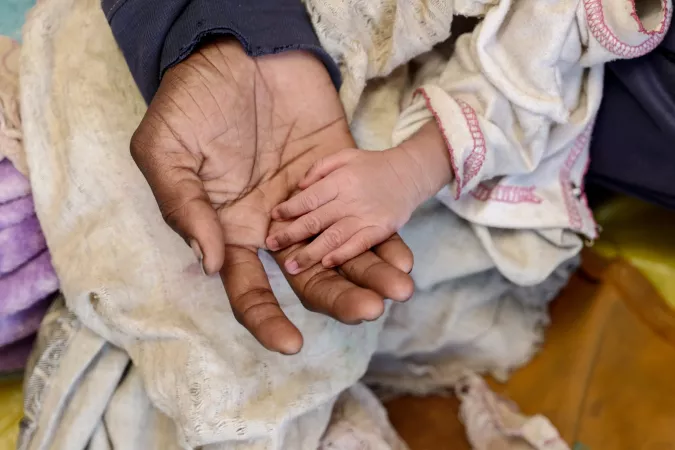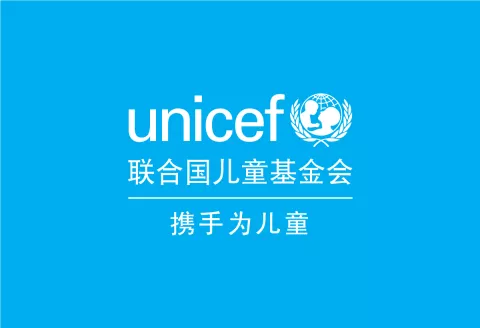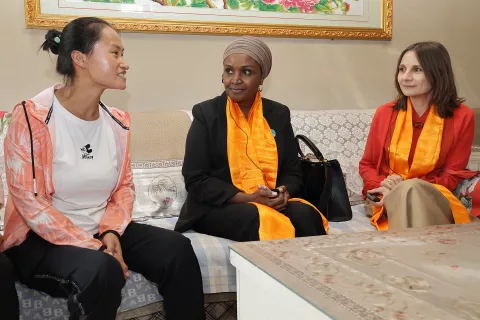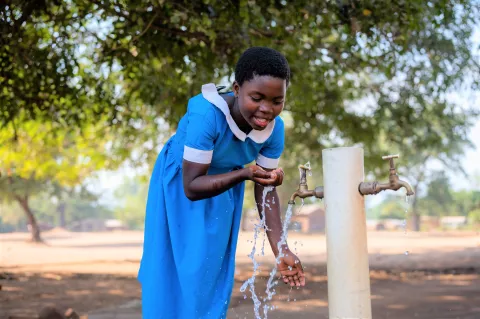Two-thirds of global goals for children’s rights and well-being off-pace to meet 2030 target - UNICEF
New report released ahead of the UN General Assembly shows historic acceleration needed to meet the Sustainable Development Goals (SDGs), only possible if world puts children at heart of national agendas
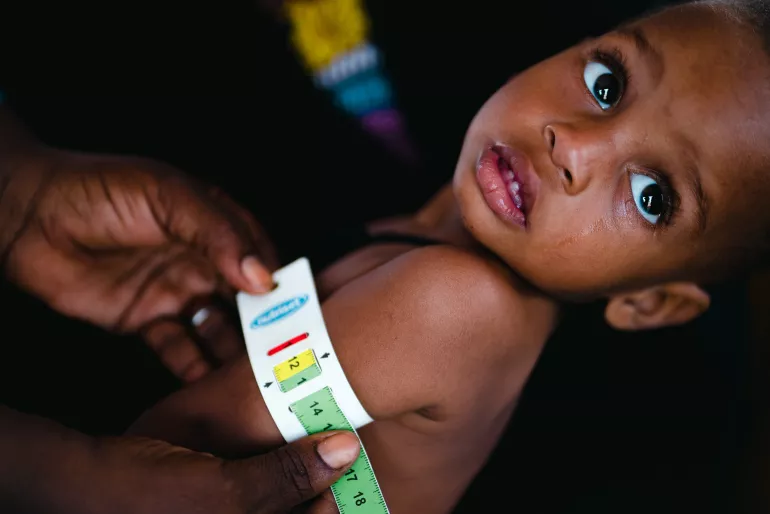
- Available in:
- 中文
- English
NEW YORK, 18 September 2023 – At the halfway mark towards the 2030 Sustainable Development Goals (SDGs), two-thirds of child-related indicators are off-pace to meet their targets, according to a new UNICEF report released today.
Progress on Children's Well-Being: Centring child rights in the 2030 Agenda warns that as of today, only 6 per cent of the child population – or 150 million children – living in just 11 countries have reached 50 per cent of child-related targets met – the highest level of achievement globally.
If expected progress continues, only a total of 60 countries – home to just 25 per cent of the child population – will have met their targets by 2030, leaving around 1.9 billion children in 140 countries behind.
“Seven years ago, the world pledged to eradicate poverty, hunger, and inequality, and to ensure that everyone – especially children – has access to quality basic services,” said UNICEF Executive Director Catherine Russell. “But at the halfway mark of the 2030 Agenda, we are running out of time to turn the promise of the SDGs into reality. The consequences of not meeting the goals will be measured in children’s lives and the sustainability of our planet. We must get back on track, and that starts with putting children at the forefront of accelerated action to reach the SDGs.”
The report – issued ahead of High-level Week of the 78th session of the United Nations General Assembly (UNGA) and the SDG Summit in New York – provides a snapshot of progress to date on child-specific indicators in the SDGs*, which were adopted by UN Member States in 2015 with the aim of ending poverty, reducing inequality, and building more peaceful, prosperous societies by 2030.
The analysis weaves together over 20 years of data across more than 190 countries, comparing where countries stand today against where they aim to be in the next seven years, and identifying the challenges and opportunities for accelerated action. The findings show a mixed picture of both progress and backsliding against the global goals.
According to the report, accelerated development is possible with strong national commitment, effective policies, and adequate financing, with some low and lower-middle-income countries making the fastest rate of progress. For example, based on available data up to 2021, Cambodia, India, Morocco, Rwanda, and Uganda, among others, performed consistently across multiple child-related SDGs, primarily when efforts were invested in areas that yielded results across several indicators. However, even these countries still have much ground to cover to reach the targets and must maintain their pace or accelerate further.
The world is still grappling with the effects of multiple crises – COVID-19, climate change, conflict, and economic crises – halting or reversing years of progress. Notably, over the past few years, the pandemic directly contributed to a historic breakdown in immunisation services, and learning poverty increased by a third in low- and middle-income countries. Goals related to protection from harm, learning, and a life without poverty are the furthest from their targets.
To achieve the 2030 targets, countries that are currently off-pace will need to accelerate progress to historically unprecedented levels. Evidence shows that investing in child rights drives and sustains results for all societies, people, and the planet, as interventions in children’s early years go the furthest toward eradicating hunger, poverty, poor health, and inequality.
As world leaders prepare to gather this week to discuss the halfway mark of the SDGs, UNICEF is calling on countries to put child rights at the heart of their agendas and take historic steps to accelerate progress by:
- Building political commitment at the national level. Governments should significantly increase and safeguard social spending in areas such as health, education, and social protection.
- Setting ambition and realistic targets and taking action. Adapt global targets to local contexts, considering technical, policy, governance, and financial capabilities to help ensure achievable actions and change the arc of trajectory towards increased acceleration towards the SDGs.
- Prioritising knowledge and evidence for children. Promote strong partnerships and collaboration among stakeholders to facilitate data collection, sharing and use, to determine the concrete actions needed to reach the SDG targets.
- Strengthening commitment toward building a liveable planet for every child. Governments and the international community should increase investments to develop and implement climate mitigation and adaptation strategies.
- Ensuring financing systems work to accelerate progress. Explore innovative domestic and international financing options that prioritise results, emphasise equity and effectiveness, and target investment in cross-cutting areas.
“A lot can happen in seven years,” added Russell. “We can renew and refocus our efforts and make the world a fairer and healthier place for all. But to do so, world leaders must become champions for children and put child rights at the heart of their domestic policy and budgeting agendas.”
#####
Notes to editors:
* On average, countries monitor just 24 out of 48 child-related indicators across the 17 SDGs. This means nations typically lack insight into half of internationally comparable measures concerning child well-being.
UNICEF has commissioned a mural on Second Avenue, a high foot traffic area where crowds gather to pass through the UNGA check. Depicting the global goals wheel, the mural bares the message ‘a lot can happen in 7 years’ and includes a QR code that leads passersby to a UNICEF webpage explaining that there are 7 years left to achieve the SDGs, and how it can be done.
Media contacts
Additional resources
About UNICEF
UNICEF works in some of the world's toughest places, to reach the world's most disadvantaged children. Across more than 190 countries and territories, we work for every child, everywhere, to build a better world for everyone.
| Visit UNICEF Global website: www.unicef.org Visit UNICEF China website: www.unicef.cn Follow us on Sina Weibo: http://weibo.com/unicefchina Wechat: unicefchina |


